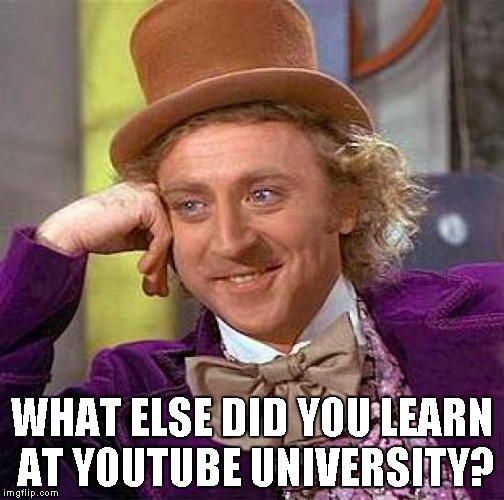Let’s be honest: our education system sucks.
It works on a cookie-cutter approach; the same style is used without due consideration to individual differences. One, we are taught things that we might never use in real life and the things that might come handy are rarely taught; and two we are not taught to learn but shepherded to meet the “benchmark”.

Every individual is unique. We have different desires, interests, aspirations and unique learning needs and styles. Yet, the education system is designed to fit “perfectly”-sized cookies. It only allows students to be different and curious as long as they fit the mold.
Each one of us turns a new leaf once we embark on our individual journeys and once faced with 2 roads that diverged into the woods, a lot of us wanted to take the road not taken but conditioned by the education system, we were practically haunted to follow the herd.
But I am not here to contempt the education system. I think schools and colleges are a launchpad for a lifelong pursuit of curiosity, learning, and personal growth. We have the most unstable job market in almost 100 years with new industries and technologies disrupting the status-quo frequently. Prospering in the modern world of business demands continual retraining, new skill acquisition, and lifelong learning.
“No man or woman has a greater appreciation for schools than I, although few have spent less time in them. No matter how much I admire our schools, I know that no university exists that can provide an education; what a university can provide is an outline, to give the learner a direction and guidance. The rest one has to do for oneself.”
Louis L’Amour
Our college qualifications are only important during the hiring process. Just having a university degree no longer fits the bill. Yet, many of us rely on our schools and stop learning once the last exam is over.

Polymaths Around Us
You all know Leonardo Da Vinci. Born a bastard child and growing up without any formal academic training, he self-educated himself and took on many challenges with his feverishly inventive imagination. He was a high-skilled scientist, artist, and inventor. Da Vinci’s interests ranged far beyond fine art. He studied nature, mechanics, anatomy, physics, architecture, weaponry, and more, often creating accurate, workable designs for machines like the bicycle, helicopter, submarine, and military tank that would not come to fruition for centuries.
Or look at the 82-year-old Steward Brand, president of The Long Now Foundation, well known for founding and publishing The Whole Earth Catalog. He is a photographer, writer, former army lieutenant, student of biology at Stanford, and co-founder of The WELL and The Global Business Network.
Hearing these stories is often inspirational, but preaching these polymaths while most 25 years old these days struggling to find their purpose and meaning in life is not useful.
I am no expert in this field and I’m still on the train of self-discovery but I believe we can’t find our passions and hidden interests unless we let our curiosity run wild.
A civil engineer learning photoshop and shifting his career to become a freelance designer. An overworked strategy consultant taking a cooking apprenticeship. A finance major learning organic farming. You will never know what you like until you try and learn new stuff.
And that’s possible when we accept a growth mindset. In her book, Mindset: The New Psychology of Success, Carol Dweck explains:
A “growth mindset,” thrives on challenges and sees failure not as evidence of unintelligence but as a heartening springboard for growth and for stretching our existing abilities.
On the other hand, a “fixed mindset” assumes that our character, intelligence, and creative ability are static given which we can’t change in any meaningful way.
Striving to learn continuously is a trait of a growth mindset. Learning isn’t something you do at someone else’s command, you’re responsible for it. If you don’t take charge of your learning, no one else will.

The Age of MOOCs, Udemy, and Ted Talks
How many online courses are you enrolled in? How many have you finished?
I’m sure you have heard of MOOCs on Coursera, Edx, subscription based courses on LinkedIn Learning, SkillShare and browsed courses on Udemy. Or you might be educating yourself by investing time in Youtube tutorials and enlightening Ted Talks.
On almost all of the above websites, you can access a lot of content for free. In the era of free content, it’s easy to quickly sign up and then forget about the courses.
Among all MOOC participants, 3.13 percent completed their courses in 2017-18, down from about 4 percent the two previous years and nearly 6 percent in 2014-15. And among the “verified” students, 46 percent completed in 2017-18, compared to 56 percent in 2016-17 and about 50 percent the two previous years.
Source

The same is true for Youtube and Ted Talks. Our mind registers that they will always be there on the internet. Available for free. I can just watch it later. Even if you do watch one Ted Talk every day, it is great for inspiration; but what use is inspiration if the lessons are not applied to improve our lives or skills.
I’ve enrolled in many online courses, and end up postponing them each week, especially the one that are self-paced. Was it because they were free? No. It was because they were just trophy wives to my resume.
Upon auditing my online courses (bingo!), I realized when I had my learning needs mapped out, I had better engagement and completion rates. I almost completed the full CS50 course on EdX (the challenges got really hard in the last few weeks) because I had a deep desire and need to understand the basics of computer science, while I did not go further from week 1 for the Science of Wellbeing course by Yale.
The same applies for self help books. If you read a book that helps you in your current situation, you will apply it and your retention rate will be higher.
Self Directed Learning
So how do we decide what to learn? What resources to take when there’s a ton of content online? How to find the right one?
Enter Self Directed Learning. SDL is a learning strategy that allows learners to take charge of their own learning process (diagnosis learning needs, identify learning goals, select learning strategies, and evaluate learning performances and outcomes). The sooner we get in the habit of self-directed learning in addition to our formal university courses, the better.
“Self-education is, I firmly believe, the only kind of education there is.”
Issac Asimov
I first learned about SDL in the 3rd year of my university degree. We had it as a core subject wherein students were allowed to pursue any course or skill externally and claim credits for that. We were given a set of guidelines to follow and submit our course proposals to the dean for approval.
It was time to get creative and I was excited! Many friends chose to do summer schools in different countries. I was tempted too but resisted to join another formal institute.
I found an online course at Acumen called Human Centred Design Thinking. I had just come back from a UN summit for young change-makers in Bangkok and I wanted to learn more about the field. Learning needs were diagnosed.
It was a hands-on 6-week course and I enrolled with another friend. We went out and interviewed many social entrepreneurs in Sydney to find answers to our research. We had a clear learning objective, a defined project, and our dean was so impressed with the report that he also asked to give a presentation to the whole class.
And the best part – the course was free.
Designing Your Learning
“You can learn just about anything now. Thirty years ago, that statement was ridiculous. In just one generation, we put everything you need to know about anything you want to know just a click away. The hard part isn’t access to it, the hard part is finding a cohort and a system that helps you do it. Because learning comes from doing.”
Seth Godin,But What Could You Learn Instead
From learning how to grow plants to quantum computing, everything is available at fingertips. But to make it work for us, we need to take control of our learning,
SDL encourages exploration of learning initiated by yourself. The more personal the learning, the more meaningful and well-understood it is.
A few months ago I started learning building websites and mobile apps with no-code tools. I watched many tutorials on Youtube and tinkered with projects on Bubble and Glide, all left half finished.
After realizing I need a more structured approach to learning these tools and get confident with launching online projects, I decided to join LaunchMBA, a community of motivated makers who will be launching 12 online projects in 12 months.
And my first project is a weekly newsletter centered around self-directed learning.
Imagine creating your own course outline. Self-designing your curriculum and learning objectives, creating your own assignments and choosing your own mentors.
The internet is full of possibilities and this is very much possible.
A Stack Overflow study reported that 69.1% of software developers appear to be self-taught. Why can’t we do this in other skill areas?
But designing education is a tricky process. The ability of a person to formulate a plan and identify the tools, resources and strategies needed for one’s own learning can be cumbersome.
To learn effectively and get better with crafting self-directed learning plans, I decided to start a newsletter called Design Your Learning.
What to Expect?
Each week I will uncover 1 skill to learn, a simple curriculum with prompts to DIY based on your requirements, resources to soak it in, and ideas for real-life projects you can do to test your skills and prove your credibility.
What Skills?
Everything from sketching to decision making to product marketing. Both hard and soft skills with a focus on 3 areas:
– Creating (using technology + art)
– Improving (personal life + hobbies)
– Promoting (ourselves + businesses)
You might already be an expert in some skills (in which I’d love your help) or not interested to learn it, but you never know what sparks your curiosity.
I’ll be working on these skills and reviewing resources myself each week before sending out the newsletter so you only get the best stuff.
Sign up below to elevate your learning!
Thanks to Aishna Sharma and Sahil Kothari for reading drafts of this.



Love it! Well written mate!
Pingback: Why Is Self-Education So Hard? - Ayush Jain
Pingback: Time for some structured learning - Ayush Jain